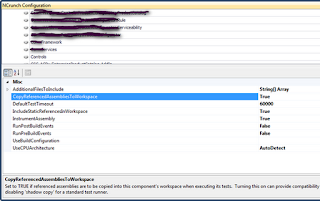I've got another dev tool that I wanted to pass along:
A few months ago, Jon Skeet posted a tweet about a new tool he was using called NCrunch. Since then, I've been playing with the tool and working with the author to resolve some of the issues (here and here) that were blocking it from working smoothly in the my environment. I believe it's now to the point where my coworkers who wish to take advantage can do so and where I can promote it's use to the world.

NCrunch, at its core, is a TDD extension for Visual Studio. It will run your unit tests in the background and provide real-time unit test results (no need to even save your file – runs as you type) by way of color-coded dots to the left of each line of code. (Green = passing, red = failing, black = not covered). It will provide details for exceptions that are thrown and many other cool features. This will allow you to get immediate feedback if changes you are currently typing break/fix any unit tests.
There's a very good demo video on the NCrunch homepage (about 6 minutes long) that I think is worth watching to get a feel for what the tool can do.
Key features (or at least "My favorites"):
- Line-by-line, real-time status of unit test coverage
- Context menu access to applicable unit test
- Tool-tip/hover bubble with details on:
- number of covering tests,
- performance,
- exception details/stack trace
- Visual indicators for performance metrics (slow tests have yellow centers -- with transparency based on level of slowness)
- Quickly run covering tests, debug into a given line
- Ability to configure how much CPU it will use.
- It's FREE!! (update: NCrunch will be going for-pay soon)
Cons:
- Feature overlap with TestDriven.Net and ReSharper test runners (although, the need for those may go away if you use NCrunch)
- Some rough edges still (see below), but the developer is very actively updating and fixing bugs, and very responsive to users on the forum, twitter, etc.
There are a couple of things to note:
- NCrunch does a lot of background compilation and running unit tests. It appears to be smart enough to only compile/run tests that are affected by changes you are making. In any case, if you have a slow machine, you may want to disable the automatic testing and run in manual mode. I have a very beefy development box (8 cores, 8GB memory) and don't see any issues (I also run ReSharper with full solution analysis mode with no issues).
- NCrunch lets you designate which unit tests to run/ignore. In our case, we have both unit tests and system tests (db dependent) in the same solution, so developers would want to enable the unit tests but ignore the system tests. When you first enable NCrunch for a project it asks you if you want to ignore all tests – I'd suggest doing that and then using the Tests window (accessible from the NCrunch menu) to unignore the tests/assemblies you care about from the right-click context menu.
- NCrunch has the option of running tests linearly or in parallel. (Update 2012-2-2: per the comment from the author, each test is run in a separate process, so no memory/static property sharing, so little risk to run the tests in parallel.)
- NCrunch compiles each project in an isolated, shadow-copied environment in the background. There are some cases, though, where the Visual Studio configurations are such that NCrunch doesn't automatically determine all of the referenced assemblies that need to be copied. In those cases, you can flip a configuration setting to have NCrunch copy the output folder over into the shadow environment. This resolves the issue, but does have a performance impact. This shows itself as an error in the NCrunch Tests window with the message "Cannot register assembly XXX or one of its dependencies. The system cannot find the file specified."

To resolve this, you need to enable the "CopyReferencedAssembliesToWorkspace" option for the project by going to the NCrunch Visual Studio menu and choosing the Configuration option, selecting the project in the Configuration window and changing the property.
